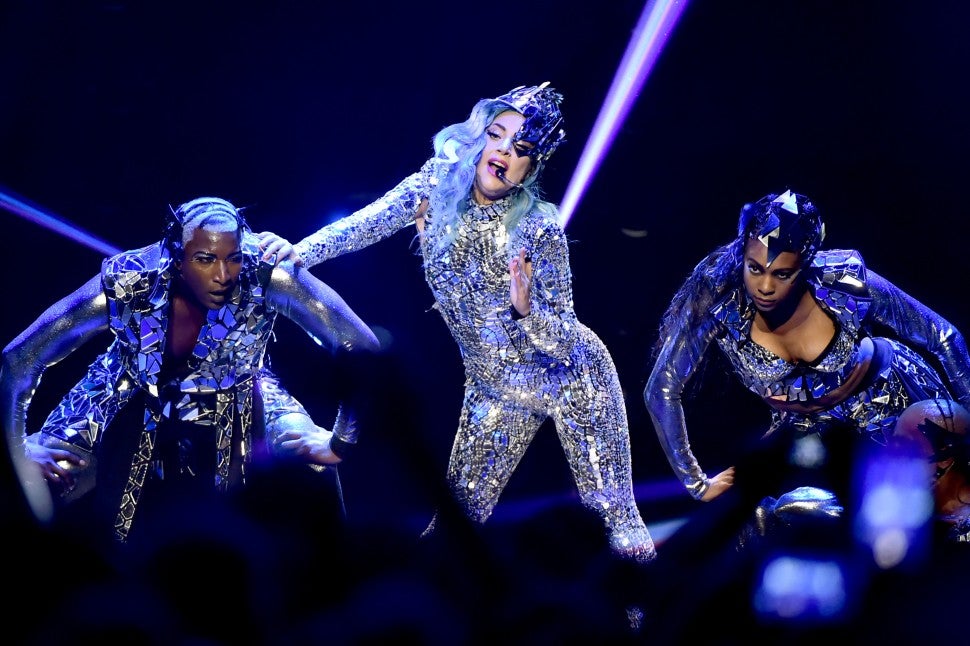Lady Gaga Mocks God and Gets Instant Judgement
This story follows the journey of these individuals, particularly Lady Gaga, Rihanna, Oprah Winfrey, Kathy Griffin, Doja Cat, Madonna, and Katy Perry, who have been perceived as mockers of God, contrasted against the biblical story of Mary Magdalene, a woman whose transformation exemplifies the power of faith and redemption.
One night, during a live performance, Lady Gaga took the stage with an elaborate set and a dramatic entrance. Amid the lights and music, she made statements that seemed to ridicule faith, particularly Christianity.
To her audience, it was another act of entertainment, yet to those who held deep religious beliefs, it was a moment of blasphemy. As she sang, an unexpected turn of events unfolded—her voice faltered, and she suddenly collapsed. Many in the audience gasped, attributing it to exhaustion or an accident, but to some, it was an instance of divine intervention, an immediate judgment for her actions.

Lady Gaga’s incident was not the first, nor was it the last, of celebrities appearing to challenge faith. Rihanna, known for her immense success in the music industry, had a Christian upbringing in Barbados. Yet, as her fame grew, her statements and performances began reflecting a deviation from those beliefs. In an unsettling interview, she once jested about being a devil worshiper, which shocked many of her fans and raised concerns about the extent of her spiritual departure.
Then there was the controversial scene at SatanCon 2023, where a woman boldly tore apart the Bible, cheered on by the audience. The act was seen as a direct affront to the Christian faith, reinforcing the perception that entertainment and popular culture were increasingly embracing irreverence toward religion.
Oprah Winfrey, one of the most influential women in media, was also criticized for statements suggesting that Jesus Christ was not the only way to heaven. Her conversation with Stephen Colbert, another public figure who identifies as a Christian, took a turn that some found offensive. Their dialogue, intended as lighthearted humor, was interpreted by many believers as a direct mockery of God, raising questions about the sincerity of their proclaimed faith.

Comedian Kathy Griffin added to the list of public figures making bold statements against faith. During an award acceptance speech, she mockingly dismissed Jesus Christ, crediting herself alone for her success. Her words, though perhaps spoken in jest, resonated deeply with those who considered them an outright rejection of God’s role in her life.
Doja Cat, another prominent artist, became infamous for her imagery and lyrics that many perceived as not just irreverent but disturbingly dark. Her continued use of biblical themes in ways that seemed to distort their intended meaning made her a subject of concern among those who follow faith-based principles.
Madonna, a pop icon known for her provocative performances, had long been associated with controversial religious symbolism. Over the years, her works have often included imagery that some see as blasphemous, reinforcing the perception that mainstream artists increasingly disregard religious sanctity.
But perhaps the most heart-wrenching case is that of Katy Perry. She was not always the superstar known for hit songs and bold performances. Born to a Pentecostal minister, she once sang worship songs and professed her faith. However, as she stepped into the world of pop music, her message and image transformed drastically. From a singer dedicated to spreading the gospel to an artist openly embracing themes that contradict biblical teachings, her journey is seen as one of the most profound falls from grace.
Her endorsement of values conflicting with Christian teachings and her apparent mockery of the Bible left many questioning how such a drastic change could occur. Yet, her story is not necessarily one of finality—many believe in the power of redemption and continue to pray for her return to faith.

In stark contrast to these figures stands Mary Magdalene, a woman from biblical times who began as a lost soul but found true purpose in Christ. Mary was once tormented by evil spirits and lived a life far from righteousness. However, her encounter with Jesus changed everything. When Christ cast out the demons that plagued her, she became one of His most devoted followers. Unlike those who mocked God, Mary cherished her faith, following Jesus even to the cross, standing by Him when others abandoned Him. She was the first to witness His resurrection, signifying her unwavering loyalty and love.
Mary’s story is one of transformation, illustrating that no matter how dark one’s past may be, redemption is always possible. It serves as a powerful contrast to the actions of those who, knowingly or unknowingly, ridicule faith. While many celebrities might currently stand on the side of skepticism or mockery, Mary’s example proves that change is always within reach.
The core message of this story is not condemnation but rather a call to reflection. Fame, influence, and artistic expression are powerful tools that can be used for good or for misguided intentions. Those who publicly challenge faith may not realize the full impact of their words and actions, but there is always an opportunity for transformation. Just as Mary Magdalene was redeemed, so too can anyone who chooses to turn back to faith.
Ultimately, this tale is a reminder that the journey of faith is one of choice. Will one follow the path of momentary fame and worldly validation, or will one seek the deeper, eternal peace that comes with faith in Christ? The answer lies within each individual’s heart, waiting to be realized.










